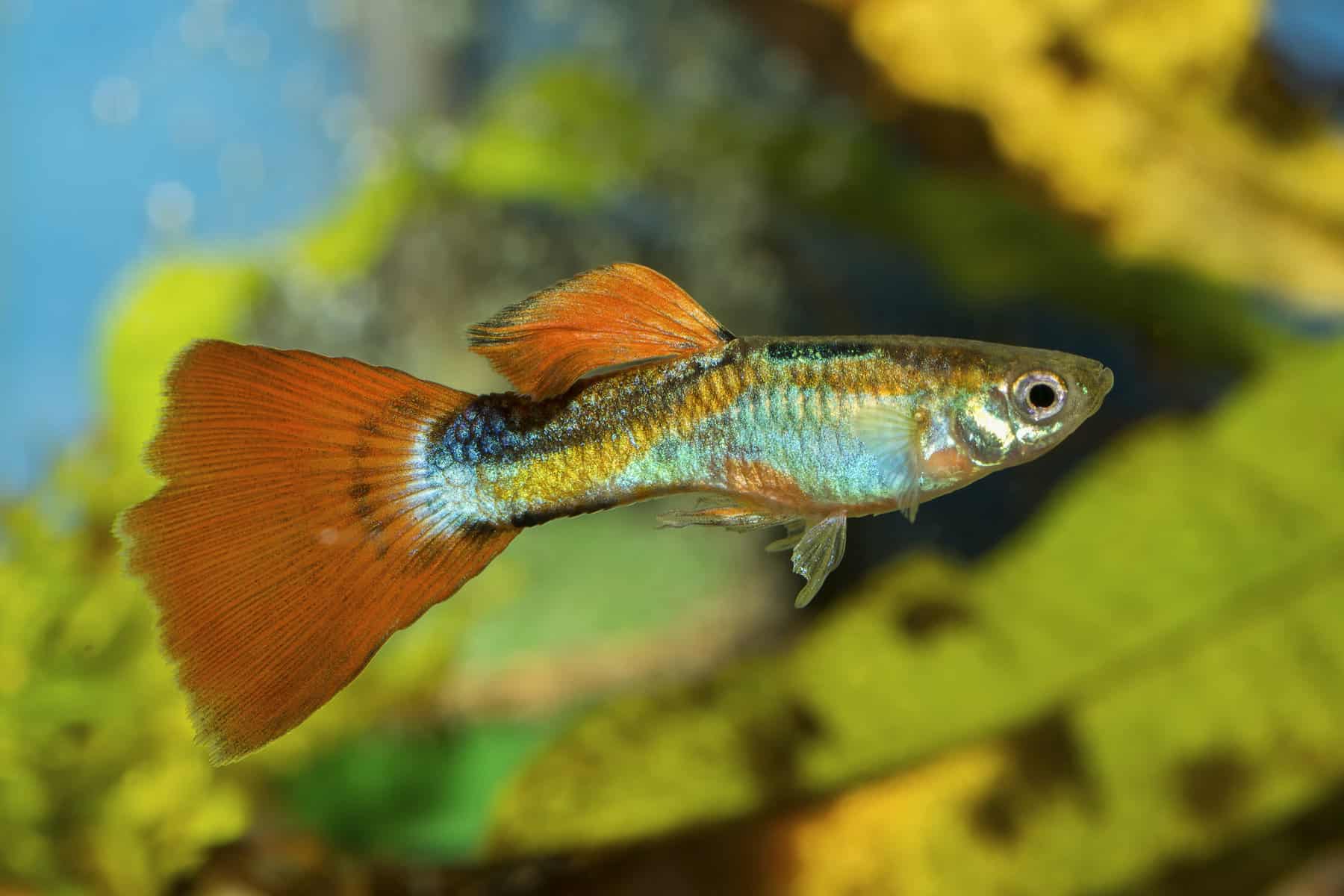Guppies can live alone, but they thrive in groups. Solitary guppies may experience stress and reduced activity.
Guppies are popular in the aquarium hobby due to their vibrant colors and easy care requirements. These small, freshwater fish are social creatures that enjoy the company of their own kind. Housing guppies in groups helps them display natural behaviors and reduces stress.
A group of three to five guppies is ideal for a balanced and harmonious tank environment. Keeping multiple guppies also enhances their lively interactions and makes for a more visually appealing aquarium. While guppies can survive alone, providing companionship ensures they lead healthier and happier lives.

Credit: medium.com
The Social Nature Of Guppies
Guppies are popular aquarium fish known for their vibrant colors. They are small, active, and easy to care for. But, can guppies live alone? To understand, we need to explore their social nature.
Guppy Group Dynamics
Guppies are social creatures. They thrive in groups. In the wild, guppies live in schools. This offers them protection from predators. In a tank, a group dynamic helps them feel secure. A group of guppies often shows more color and activity.
| Group Size | Behavior |
|---|---|
| 1 Guppy | May feel lonely, less active |
| 2-3 Guppies | Better than one, but still not ideal |
| 4 or More Guppies | Ideal group size, more active and happy |
Solitary Vs. Social
A solitary guppy might survive, but it won’t thrive. It could become stressed and less active. Stress can lead to health issues in guppies. A social environment, on the other hand, keeps them happy and healthy. Social guppies display vibrant colors and more natural behaviors.
- Loneliness: Single guppy may feel isolated.
- Stress: Lack of social interaction causes stress.
- Health: Social guppies are healthier and more active.
- Colors: Grouped guppies show brighter colors.
In a group, guppies also establish a pecking order. This helps them interact better. Watching their social interactions can be fascinating. It adds interest to your aquarium.
- Introduce guppies in groups of four or more.
- Monitor their behavior and health regularly.
- Provide hiding spots to reduce stress.
In summary, guppies are social animals. They thrive in groups. Keeping them alone can affect their health and happiness. Ensure your guppies have friends for a happy, healthy life.
Guppy Behavior In The Wild
Guppies are fascinating creatures often found in home aquariums. But their natural behavior in the wild is even more intriguing. Understanding their natural habits can help us better care for them in captivity.
Natural Habitats
Guppies thrive in freshwater environments. They are native to South America and the Caribbean. You can find them in rivers, streams, and small pools.
The water in these habitats is warm. It usually ranges between 75 and 82 degrees Fahrenheit. The water is often shallow and slow-moving.
| Region | Water Type |
|---|---|
| South America | Freshwater |
| Caribbean | Freshwater |
Wild Guppy Interactions
In the wild, guppies are not solitary creatures. They live in groups called schools. These schools can have anywhere from a few to hundreds of guppies.
Living in schools offers many benefits. It helps them avoid predators. It also makes it easier to find food. Guppies feed on algae, small insects, and plant matter.
Social interactions are important for guppies. They use body language and color changes to communicate. Males often display bright colors to attract females.
- Algae
- Small insects
- Plant matter
Understanding these behaviors can improve their care in home aquariums. It ensures they live happier, healthier lives.
The Impact Of Isolation On Guppies
Guppies are social fish that thrive in groups. Keeping a guppy alone can have significant effects. Let’s explore how isolation impacts these vibrant creatures.
Stress Indicators
Isolated guppies show several signs of stress. Here are some common indicators:
- Reduced activity: They swim less and may become lethargic.
- Loss of appetite: They may eat less or ignore food.
- Color fading: Bright colors may dull, indicating distress.
Health And Growth
Isolation affects a guppy’s health and growth negatively. Key points to consider:
| Aspect | Impact |
|---|---|
| Immune System | Weaker, making them prone to diseases. |
| Growth Rate | Slower due to stress and reduced activity. |
| Lifespan | Shorter compared to guppies in groups. |

Credit: www.aquariadise.com
Tank Considerations For Solo Guppies
Guppies are small, colorful fish that many people love to keep as pets. But can a guppy live alone? Yes, it can, but you need to make special tank considerations. This section will guide you through the best tank setup for a solo guppy.
Size And Setup
A solo guppy needs a minimum of 5-gallon tank. A larger tank is better if you have the space. More water means a more stable environment. Small tanks can have quick changes in water quality.
Ensure the tank has a filter and heater. Guppies prefer water temperatures between 75-82°F. Use a thermometer to check the temperature daily.
Cover the tank with a lid. Guppies can jump out if they feel stressed. Use an aerator to keep the water oxygen-rich.
Enrichment Essentials
Enrichment is important for a solo guppy to stay happy and healthy. Add plants like Java moss or Anubias. These plants provide hiding spots and reduce stress.
Include decorations like caves or tunnels. These give the guppy places to explore. You can also add floating plants to mimic their natural habitat.
Feed your guppy a varied diet. Use flakes, frozen foods, and live foods. This keeps them healthy and active. Change the food type every few days.
Here’s a quick summary of tank needs for solo guppies:
| Item | Purpose |
|---|---|
| 5-Gallon Tank | Minimum space for swimming |
| Filter | Clean and healthy water |
| Heater | Maintains water temperature |
| Aerator | Oxygenates the water |
| Plants | Hiding spots and reduce stress |
| Decorations | Exploration and enrichment |
| Varied Diet | Health and activity |
Pros And Cons Of Single Guppy Keeping
Can guppies live alone? This question often pops up among fish enthusiasts. Understanding the pros and cons of keeping a single guppy can help you make an informed decision. Below, we’ll explore the benefits of solitude and the drawbacks to consider.
Benefits Of Solitude
Keeping a single guppy has its advantages. Here are some benefits:
- Less Aggression: A solo guppy won’t face bullying or territorial disputes.
- Simple Care: One fish means fewer water changes and less cleaning.
- Cost-Effective: You save money on food and medications.
Drawbacks To Consider
There are also disadvantages to keeping a guppy alone:
- Loneliness: Guppies are social and may feel lonely alone.
- Reduced Activity: A single guppy may be less active and playful.
- Limited Breeding: No chance for breeding without other guppies.
Creating A Stimulating Environment
Guppies are social creatures, but they can live alone with the right care. Providing a stimulating environment can keep a solo guppy happy and healthy. This section explains how to create that perfect setting.
Interactive Elements
Interactive elements are essential for a stimulating environment. These can include various decorations and objects. Here are some examples:
- Plants: Live or artificial plants offer hiding spots and exploration areas.
- Caves: Small caves provide shelter and security.
- Toys: Floating or sinking toys can keep your guppy entertained.
- Backgrounds: Colorful backgrounds can make the tank visually appealing.
Routine Variation
Routine variation can prevent boredom in a solo guppy. Changing their routine keeps things interesting.
Here are some ideas to vary their routine:
- Feeding Schedule: Feed at different times of the day.
- Food Types: Offer a mix of flakes, pellets, and live food.
- Cleaning Schedule: Perform partial water changes at different intervals.
- Decor Rearrangement: Move decorations around occasionally.
Ensuring your guppy has a stimulating environment improves its quality of life. Use these tips to keep your solo guppy happy and healthy.
Companion Options For Guppies
Guppies are social and thrive in groups. They enjoy interacting with other fish. It’s essential to choose the right tank mates for guppies. This ensures their happiness and health.
Suitable Tank Mates
Guppies get along with many fish species. These are some suitable tank mates:
- Neon Tetras: Small, peaceful, and colorful.
- Platies: Friendly and easy to care for.
- Corydoras Catfish: Bottom dwellers that clean the tank.
- Mollies: Similar size and temperament to guppies.
These fish are non-aggressive and enjoy similar water conditions. They help create a harmonious tank environment.
Table Of Suitable Tank Mates
| Fish Species | Temperament | Tank Level |
|---|---|---|
| Neon Tetras | Peaceful | Mid |
| Platies | Friendly | Top/Mid |
| Corydoras Catfish | Calm | Bottom |
| Mollies | Docile | Top/Mid |
Avoiding Aggression
Some fish can be aggressive towards guppies. Avoid these species to ensure a peaceful tank:
- Betta Fish: Known for their territorial nature.
- Angelfish: Can become aggressive as they grow.
- Large Cichlids: Often bully smaller fish like guppies.
- Tiger Barbs: Known to nip at guppies’ fins.
Keeping guppies with peaceful species prevents stress and injury. Always monitor new tank mates for any signs of aggression.
Expert Advice On Guppy Care
Guppies are small, colorful fish that many people love. They are easy to care for and brighten up any tank. But, can guppies live alone? Let’s hear what experts say.
Aquarist Recommendations
Aquarists suggest keeping guppies in groups. Guppies are social fish. They enjoy the company of other guppies. Keeping them alone can make them feel lonely and stressed. Stress can lead to health problems.
- Group Size: Keep at least three guppies together.
- Tank Size: A 10-gallon tank is good for a small group.
- Water Conditions: Keep the water clean and at the right temperature.
Guppies are happier and healthier in groups. They swim together and interact. This makes them feel safe and less stressed.
Long-term Health Tips
Keeping guppies healthy requires attention to their needs. Here are some tips for long-term care:
- Diet: Feed them a balanced diet. Use high-quality flake food. Add live or frozen food sometimes.
- Water Changes: Change 25% of the water weekly. This keeps the tank clean.
- Temperature: Maintain water temperature between 72-82°F (22-28°C).
- Filtration: Use a good filter to keep the water clean.
Healthy guppies live longer and have bright colors. They also breed more easily. Proper care ensures they thrive in their tank.
| Aspect | Recommendation |
|---|---|
| Group Size | At least three guppies |
| Tank Size | Minimum 10 gallons |
| Water Temperature | 72-82°F (22-28°C) |
| Water Changes | 25% weekly |
Following these tips helps guppies stay happy and healthy. They will live longer and bring more joy to their owners.

Credit: www.reddit.com
Conclusion
Guppies can live alone, but they thrive in groups. Social interaction keeps them active and healthy. If you choose to keep a single guppy, ensure it has a stimulating environment. Balanced diet and proper tank conditions are crucial. Consider tank mates for a happier, more vibrant guppy life.
